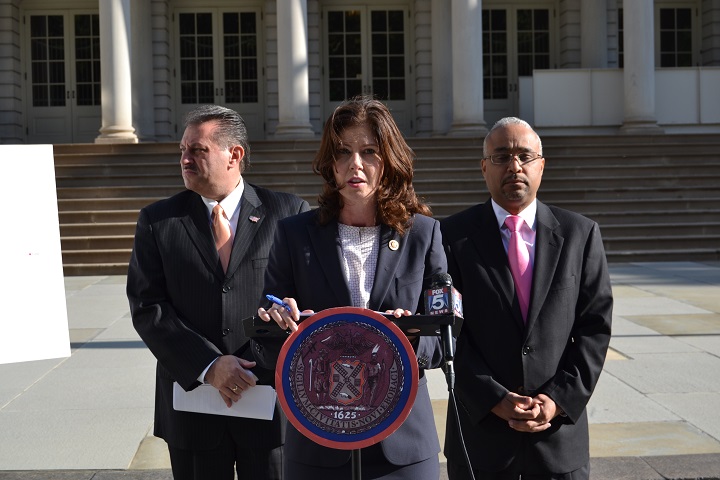Putting people in hotels is not going to solve New York City’s homelessness crisis, a number of elected officials from Queens told Mayor Bill de Blasio during a press conference on the steps of City Hall on Thursday morning, Oct. 6.
New York’s homeless problem is no secret. Every day nearly 60,000 people in New York City have no home to call their own. The city has taken to placing people in hotels, such as the former Pan American Hotel in Elmhurst, the Holiday Inn in Corona and the proposed site at the Holiday Inn Express on 55th Road in Maspeth, even after Mayor Bill de Blasio said repeatedly that his administration would move away from using hotels as shelters.
“The mayor is far from achieving his goal as the number of homeless families living in hotels has more than doubled since he made that announcement,” said Councilwoman Elizabeth Crowley. “Housing families in hotel units without kitchens is against the law.”
Local residents and elected officials have repeatedly said that this plan is not a viable solution for the homeless or the communities, most recently at the proposed Holiday Inn site in Maspeth.
Crowley urged de Blasio to renew the city’s contracts with legal cluster sites to shelter the homeless legally.
“The city has existing contracts with legal cluster homeless shelters. These are apartments and buildings which are in danger of being lost,” Crowley said. “That is 11,000 people who are risk of being evicted from their homes because of faulty plans this administration has. The bottom line is hotel conversions should not be an option when creating shelter capacity. Not only is it illegal in New York City, it is inadequate and wrong.”
State Senator Joseph Addabbo compared the proposed Maspeth homeless shelter site to a “prison-like setting,” with metal detectors, 24-hour surveillance, security guards on every floor and a curfew.
“That’s not how you help someone. That’s not how you help families get back on their feet,” he added. “That’s putting them in a prison-like setting. It’s not right. Our people deserve better. Our communities deserve better.”
State Senator Jose Peralta shared the anger of his colleagues since a Holiday Inn in Corona (which he represents) was recently turned into a homeless shelter with no warning, even after the Department of Homeless Services (DHS) said there were no plans to convert the hotel into a shelter.
“Lying is in the DNA of the DHS,” Peralta said. “I don’t trust DHS. I don’t trust the administration.”
Instead of keeping the community and its elected officials in the dark, those at the rally — including Councilman Barry Grodenchik — offered some solutions.
In one example, they advocated for more affordable housing and rent subsidies to keep those at risk of becoming homeless from being priced out of the market. Assemblyman Andrew Hevisi has a nearly $500 million plan to do just that, while Governor Andrew Cuomo has a $2 billion plan to help homeless individuals across the state.
These plans, however, will take some time to implement, so more immediate solutions are needed. The lawmakers suggested that the city look at its vacant land and use that to build modular homes on in a short amount of time, as the organization Fiorello Homes for the Homeless has suggested to elected officials.
Foreclosed homes should also be looked at as a more viable solution to housing the homeless than warehousing them in hotels. Another solution put forth was to ask Governor Cuomo for assistance with the homeless problem and utilize the entire state.
“What a novel idea if the mayor could ask the governor, ‘We have a crisis here in New York City. Can we find other places with a better housing stock, a more affordable housing stock throughout the state where maybe the cost of living is lower than it is here in New York City?’” Addabbo suggested. “But I am not too confident that this mayor could upon our governor for assistance and now we are not utilizing the whole state.”
Phil Wong, a resident of Maspeth who attended the rally, agreed with the lawmakers that there are better solutions to this problem, specifically looking at the city’s vacant land.
“If they can put trailers into schoolyards for Universal Pre-K, they can certainly put trailers on empty lots,” he said. “Money is being spent in the wrong place. You’re creating a tale of two cities by putting people in hotels.”



































